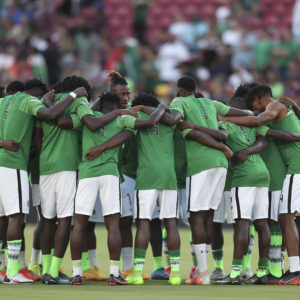Why glory has eluded the Tunisian national team
Tunisian clubs are among the most feared and successful sides in Africa, but the national team have won the Afcon just once.
Author:
21 January 2022

Tunisia’s lone Africa Cup of Nations (Afcon) success is such a distant memory, even to those who witnessed it in 2004, that it feels like it was a lifetime ago. It is made worse by their North African rivals, Egypt and Algeria, having enjoyed more recent and prolonged success.
The Eagles of Carthage gave their people the perfect Valentine’s Day gift 18 years ago when they conquered the continent in their backyard by defeating another North African rival, Morocco. But that love story has soured over the years, with only the country’s clubs keeping the spark alive by doing well in continental inter-club competitions.
It’s an interesting phenomena that a country whose national team has not done well in Africa, even with the quality they have, are among the best when it comes to club football. Tunisia, Egypt, the Democratic Republic of Congo and Morocco have dominated the continental club scene in the past three decades.
Tunisian clubs have won 22 continental and intercontinental trophies since the 1990s, a period that marked the beginning of their rise. The bulk of those trophies were won by Espérance, Club Africain, Étoile du Sahel and CS Sfaxien. They are second only to the unreachable Egyptian teams – Al Ahly, Zamalek and Ismaily – who have a combined 38 titles. The Tunisian national team has only two, one being the 1963 Arab Cup.
Related article:
Why is there such a huge discrepancy between the success of the Tunisian national team and the country’s clubs?
The first factor is not having enough players plying their trade in Europe, a tougher environment. Tunisia has consistently relied on home-grown talent. The only Tunisian footballer who could potentially play in the Uefa Champions League this year is 18-year-old Manchester United midfielder Hannibal Mejbri. The only two players who have been involved in the Uefa Europa League are 25-year-old Ferencváros midfielder Aïssa Laïdouni and 20-year-old Brøndby midfielder Anis Ben Slimane. Additionally, Tunisia’s current best striker and vice-captain, Wahbi Khazri, plays for top-division French league team AS Saint-Étienne, who are bottom of the table.
“Unlike other national teams in the region, such as Morocco, Algeria or Egypt, we cannot count on top players who play in Europe,” says Tarek Ghdiri, a Tunisian journalist and Zajel.tn correspondent for the Afcon. “Generally, our players are tactically disciplined, but they are not technically up to the best. We don’t have players of the calibre of Mohamed Salah, Vincent Aboubakar or Riyad Mahrez. Usually, Tunisian footballers in Europe play for mediocre teams in mediocre leagues. This is why their level has never been high enough so far and the team’s competitiveness at an international level has been affected.”
Egypt and Zambia have, however, debunked the myth that for an African national team to do well in competitions they must have in their squad a number of players who ply their trade in elite European leagues. Both have done well with Africa-based players to win the Afcon – against star-studded teams with players in some of the best clubs in Europe. So what else could be contributing to Tunisia’s shortcomings?
A coaching problem?
There seems to be a mental block that has affected Tunisia’s performances since their 2004 triumph. The North Africans experienced various failures from 2008 to 2017, especially when it came to qualifying for the Fifa World Cup. They crumbled at decisive games and these failures caused a mental barrier that they only began to break in 2017, when they qualified for the 2018 World Cup, and in 2019, when they reached the semifinals of the Afcon and finished fourth overall.
During the 2018 World Cup, Lassaad Dridi, who recently coached Tunisian giants Club Africain and Étoile du Sahel, bemoaned the way the country was coaching its young players. He said on a local television channel that children are told to kick the ball away instead of trying to build up from the back.
Mohamed Sahli, who has a lot of experience training talented young people in Austria – in particular at Red Bull Salzburg and the youth squads of the Austrian national team – highlighted another shortcoming. He told Radio IFM that Tunisian players have the talent but that coaches jump the gun when it comes to their development. To illustrate his point, he talked about what he observed watching his nephew being coached.
“A 10-year-old boy should play without thinking about the tactics,” said Sahli. “He is small and should satisfy his hunger for football. Why do the best footballers come out of street football? Because there is no refereeing and there is no coach they fear. So they are more creative and dare whatever. They touch the ball more. In Tunisia, however, the most advanced tactics and aspects of football are taught too early.”
Related article:
A coach of the youth divisions of an important Tunisian team – who did not want to be named because his views are critical of his peers – confirmed that today in Tunisia, when recruiting players, priority is given to physical rather than technical qualities. This would explain Tunisia’s atrocious results in youth football. The Under-17 national team’s best showing at the Under-17 Afcon was finishing third in 2013, while their best showing in the Under-20 division was finishing second in 1985. The national team has never qualified for the Olympic Games.
The omnipresent shadow of capitalism adds to these problems. “Unfortunately, Tunisian clubs have delegated the task of training young footballers to commercial academies run by businessmen or former footballers with money,” says Ghdiri.
The most known academies are in the capital city of Tunis. Among them is the Ooredoo Football Academy, which is linked to and named after a Qatari multinational telecommunications company. “The formation of young talents in the country’s major clubs is truly catastrophic. Now, all parents enrol their children in paid academies and this creates inequality. It isn’t the best player who is awarded, but the one who has the richest family.”
There’s no doubt that Tunisia has serious potential. In their past 15 appearances at the Afcon, they have crashed out of the group stage only four times. On the other occasions, being eliminated in the quarterfinals was their worst showing.
A turning tide
The situation might soon improve. Current coach Mondher Kebaier seems to be taking the national team towards success.
Under his helm, Tunisia qualified easily for the 2021 Afcon, their 15th in a row. They have also reached the 2022 World Cup play-offs by playing good football. And in December, they reached the final of the renewed Fifa Arab Cup, even though the team was without some of their best Europe-based players.
The level of Tunisian footballers based in Europe has been rising. Although it has not increased so much that we can see them in major European clubs, the Tunisian federation and its technical staff seem to have found the missing pieces to the puzzle.
The leadership of centreback Dylan Bronn has brought greater security in the defensive phase. Mohamed Dräger’s runs ensure greater offensive thrust on the right wing. And the physicality, athleticism and sense of position of Ellyes Skhiri, Laïdouni and Slimane can finally give protection to the creativity of attacking players.
Related article:
“African inter-club competitions and the Afcon are two different contexts,” said coach Kebaier. “When we talk about national teams, Tunisia has a significant potential of players, especially those who were born and raised in Europe. This is the reason why, in recent years, we have always been a credible contender in all competitions.”
Players of the diaspora no longer struggle to integrate with local footballers, Kebaier said. “We have passed that stage. The group cohesion and solidarity between the players is something that was worked on during the first phase of this national team’s project.” And two of the main issues over the years – the claim that the squad does not have many players in Europe and that many of the players they do have are small in stature – have been debunked.
After a controversial end to an Afcon game in which they lost to Mali, Tunisia came back to thump Mauritania 4-0. They scraped into the last 16, where they will face Nigeria, after losing to Gambia in their last group match. They have shown in glimpses that they can be a force again, but will need more than that to beat the Super Eagles. “These players have been working together for five years and we have moved on [and are] starting [to work] on other values,” Kebaier concluded. “We reached the Arab Cup final, and I hope we continue to achieve very good performances starting from this Afcon.”



